The Walking Dead - A Beautiful Fraud
By leebmx 10 Comments
Yep, this is a bit long, but there is cake and ice cream for anyone who makes it to the end...
The moment that best sums up The Walking Dead comes as my eyes are welling up with tears and my throat is choked with emotion, and sobbing silently in front of my TV I hammer away at the A button of my controller with all my might. The utter and ridiculous incongruity of my emotions and actions forces out a blast of surprised laughter. Then I go back to sobbing and furious jabs of my index finger.
I cannot think of another game which has rung so much emotion from me, yet at the same time The Walking Dead is barely a game. It is an experience I cannot shake from my head, an experience I want to relate to everyone I meet, but at the same time it is insultingly simple, deceptive in its intent, and for a great deal of the time, downright broken. It is really extraordinary that something this mechanically and technically bad should pack the punch it does and even more extraordinary that it has garnered such critical and financial success.[1]
The Walking Dead has left me hugely confused about what I, and gamers in general want from their pastime and has left me questioning what criteria I use to judge a game’s quality. What does it say about what we want from games that something this technically bad and deceptive in structure can be such a hit?
Before I go any further it might be worth me putting down exactly what I think is so poor about The Walking Dead in case people are confused or disagree with me. By the criteria we generally use to judge games TWD is at best mediocre. The art is passable, not poor but with no great style and any animation can generously be described as workmanlike. As for the sound design, well the zombies squelch and the guns go bang. However worst of all is the gameplay, supposedly what makes a game worth playing. The gameplay in TWD separates into three basic sections, puzzle solving, action, and dialogue. Puzzle solving boils down to searching for an item and using it on the only puzzle in the area. Obviously Telltale thought normal adventure games with inventories stuffed full of rubber chickens and the like were all played out and what players really want is something undemanding to do so they don’t rush through the story too fast. The puzzles in TWD are the equivalent of doing 50 press-ups between each chapter of your book so it lasts longer, although at least this would give you some muscle tone.
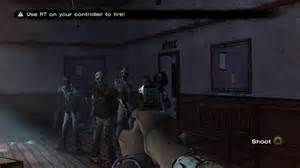
I am not sure why Telltale tried to include third person shooting, or tense escape sequences because without exception they are awful, providing moments of tension only through the abject brokenness of the controls. I actually screamed in anger at one sequence (an awful high-pitch wail which started all the cats and foxes in my area screeching) where Lee has his foot stuck through the wooden stairs of a bell tower while approaching zombies must be dispatched. The horrible sluggishness, the weird aiming which scores a hit when you shoot a foot wide but registers nothing at other times, the action sequences are without question dreadful. They come across exactly as they are, fast-paced 3rd person action sequences forced onto an engine designed for methodical pixel hunting. Besides these, the rest of Lee’s important actions were left to Quick-Time-Events, and while these worked they were implemented in a drab an uninteresting fashion especially when compared with games like Asura’s Wrath. No attempt is made to contextualise the button prompts within the game, or even vary the basic sequences, it is simple finger-mashing stuff from the first time Lee crawls away from the cop zombie in episode one till his heartbreaking crawl across the floor in the final scene.
The dialogue, and the choices the player makes were presented as a tool to drive the story forward; the decisions the player makes determining how the story plays out for Lee, Clem and the other survivors. However this is true on only the most basic level, affecting only tiny details at the margins. Lee’s actions have no meaningful effect on the state of the world in TWD. This isn’t a game like Heavy Rain where characters can drop out of the storyline completely and can live or die depending on your actions. In TWD the world plods on remorselessly with the player unable to change the how pre-determined events will occur. The story always ends with Clementine alone and everyone else dead or missing. I have seen this presented elsewhere as a comment by Telltale on the powerlessness of players to control the huge events which swirl around their lives, that ultimately all we can change is how we live our life and how we react to those around us.2 If you accept this you may as well believe that the action and shooting are shoddy because you are playing a character unused to fighting for survival, struggling with firearms and thrown off balance by this terrifying new world. It is too convenient an excuse for what is basically a system designed by Telltale to maximise the illusion of choice while keeping the design complexity down to a minimum. It is telling that you only need to complete the game once to get all the achievements, this isn’t a game with alternate endings or different ways of advancing the plot.
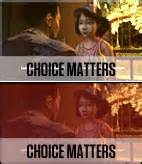
All the player is offered in TWD is the chance to tinker round the edges, and even this is presented in clumsy mechanical way which almost manages to ruin the believability of what is unfolding on screen. Despite your choices only affecting minor story beats like when someone dies (never if -because they always die) or how much other characters like you Telltale seems desperate to show you when these ineffectual decisions are being made. Messages like ‘Kenny will remember that,’ or ‘Clementine was pleased you told the truth,’ will pop up at every hinge in the story and at certain major points characters will give speeches which run like a laundry list of the all the decisions you made in your respective interactions rather than talk like a real person. Before you leave to rescue Clementine, Kenny runs through a list of all the times you have taken his side (or not) during the game, a spreadsheet speech matched by Clementine’s captor’s tickbox summing up of your deeds during the game. I get that players want to know how they have affected their characters path through the game but it could have been done with far greater subtlety, and it is great credit to the potency of the drama that it survives this cack-handed exposition.
It is a shame when the mechanics of the game poke through in this way because the dialogue and writing in general are what make TWD memorable. The great success of this game is in creating a cast of believable, empathetic characters and then putting them into situations which are not just entertainingly brutal and sickening but also morally grey. What is so great, and so human, about the TWD is not that you can make the wrong choice, but most of the time there is no right choice at all. This is something new and challenging for gamers, something we undoubtedly recognise from our real lives but something we very rarely encounter with a controller in our hands. Most games put us squarely at the centre of everything, the white-hatted hero kicking the universe back into shape. Games which do give the player a moral choice may as well have a cartoon devil and angel arguing it out over the player’s head while he chooses, so binary are the offerings. Kick a man through a window or take him in? Kill the Little Sister for a reward now or redeem her for a reward later - it’s all basic stuff. TWD doesn’t have a meter filing up each time we make a choice because nearly all the time the morality behind each decision is murky and it is impossible to tell right from wrong. This ambiguity works wonderfully well in making us more invested in the game, as we agonise over the horrible deeds we are forced into and come away from each crisis wondering how we could have done things differently. This is choice based in the real world where we don’t get the choice to push the Paragon or Renegade button before each action and are decisions aren’t based on what ending or achievements we wish to receive. 3
This complex, adult system of morality enables the TWD to go where this medium generally will not. Children die, by your hand if you chose, something which would be an awful look-at-me, shock factor moment in a game like Homefront but here (in the case of Duck’s death especially) is an incredibly moving episode, which shocks our emotions rather than our sense of taste. Moments like this happen over and over again through the game but it never feels as if it is engaged in one-upmanship, trying to top itself by providing ever-increasing instances of horror and shock. These events during the game are shocking, but they shock our emotions rather than our sensibilities. The overriding point here is that because the game has so successfully created a world which feels impossible to fully grasp and control, the opposite of nearly all other videogame worlds, means it has license to go to places other games will not, with the players consent.
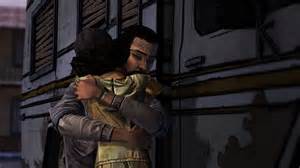
This swirling sense of moral ambiguity and horror encloses the heart of the story, a relationship between your character, a convicted murderer, and a little girl. It is one which could collapse in mawkish sentimentality but which remains believable and touching all the way to the end. Usually inserting a child into a storyline, especially in a medium in which they are visible on screen, is a shortcut to grabbing emotions. Goggled-eyed, flaxen hair little moppets are staples of the movie world although usually provoking nausea and feelings of infantacide4, at least in myself. The advantage of an interactive medium, one which Telltale has cunningly recognised, is that the impulse to protect and nurture which children engender can be corralled into action rather than just the anxious parental concern we might feel in a movie theatre. You want to protect and care for Clementine from the moment you meet her in the first episode, and this emotion is heightened by your developing experience of the world you are shepherding her through. The bond of attachment I developed with this charming character is unlike anything else I have felt through my videogame playing history and on par with other attachments I have developed for characters in cinema and literary settings. Tom Bissell tells a story about him playing a section of the game where one of the characters tries to take Clementine away from him. He reacted with violent emotion to the incident, as I am sure many of us did and turned to see tears in the eyes of his watching girlfriend, tears provoked not by the game itself but by seeing the protective fatherly emotions being stirred in the potential future father of her children. That’s pretty serious stuff and amazing depth of feeling to be stirred by a mere videogame, (you should hear those last two words in a sarcastic, highbrow tone) but feelings I am sure many of us recognised being stirred by playing TWD. I don’t know if I have ever watched many more painful and heart-wrenching moments on stage or screen anywhere than the final scene with Clementine saying goodbye to Lee. It will stay with me for a long, long time. It says a huge amount about the quality and believability of the writing that I was so desperate for there to be some way for Lee to survive being bitten, hoping against hope that he would fall asleep and wake up cured, yet at the same time knowing the game couldn’t give this to me. A happy ending would sell out all the great work gone into making me empathise with these characters, but all this great work was really making me want a happy ending.
This is a confusing situation for those of us who follow videogames. Here we have a game which to all intents is a terrible game, but a fantastically moving experience. It defies all accepted logic about what makes a good videogame. Go back a few years, when gaming magazines treated reviewing like a science, scoring points for categories and averaging the result and TWD would have scored terribly. Yet here it is current sitting in the low 90’s on Metacritic with an armful of end-of-year awards and bumper sales. At first sight it would seem as if it says that for all the years we have supposedly been yearning for more graphics, faster gameplay, better AI, multiplayer and the like, what we really wanted was believable characters and a story we could get emotionally involved with. That all those years we were salivating over screenshots of Quake in PCGamer, like teenage kids with a stolen Playboy, what we actually wanted was in-depth features on sensitive writers tackling difficult themes in our games.
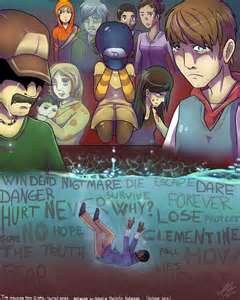
Look a bit closer and the success of TWD isn’t actually that hard to understand. Consider some of the really loved games from the last decade or so, big sellers but also games which get people talking and make people passionate. A lot of these, Half-Life 2 (Alyx Vance as grown-up Clementine anyone?), Mass Effect, Dragon Age (most Bioware really) GTA, succeed, yes because of great gameplay but also because of the stories they tell us and the way they let us get involved in relationships with the characters in the game. At heart we are all suckers for human interaction, the thing all our parents, teachers and commentators assured us we were desperate to avoid as we disappeared into our bedrooms to tap away at controllers and keyboards.
However the success of TWD doesn’t just tell us that good stories and good writing make already solid games more engaging and entertaining. It tells us that games are actually the place to tell stories. As I mentioned earlier, one of the reasons Clemetine doesn’t join the long list of children in games you would rather euthanise than spend time with stems partly from the fact we are allowed to act on the paternal feelings she provokes, rather than sitting inert as another child actor makes you want to claw your eyes out and shove them in your ears. Taking that step from being told a story to being in a story makes a huge difference to how we react to the media we are experiencing. Suddenly instead of feeling that a character feels guilt for their actions, we feel that guilt directly as we take the decisions ourselves. At the end of TWD I didn’t feel bad because Clementine was going to be on her own, I partly felt bad because I was leaving her on her own. Picking up a controller and taking control takes us through the pane of glass which separates us from the action when we watch TV or a movie. The reason people were so unhappy about the ‘wanting to protect her,’ comments about Lara Croft in the new Tomb Raider game wasn’t just because it assumed that all gamers were men but also because the comment seemed to misunderstand precisely what we do when we play video games. We are not helping Mario rescue the princess or Shepard save the Universe (or not, or combine it with synthetics or grrrrrr…. I don’t know) we are Shepard and we are Mario. The reason people got so angry at the end of Mass Effect 3 was not because the story did not have a satisfactory conclusion, but because all the choices and actions we had taken over 3 games were ignored and abandoned. We’d decided whether to kick Krogans through windows, sterilise planets, fought scores of battles, shagged half the galaxy and now we were being told none of it mattered. Tell us a story and it’s your story, let us play it and it’s ours.
Despite all the praise and sales it is hard to see how TWD is going to have any real influence over the future of videogames. To me it seems destined to remain an odd one-off, a strange artistic oddity in gaming’s canon. The more I think about it, the more it seems like a trick, a project conjured up to hoax gamers who normally run a mile from anything with a whiff of artistic experimentation into playing a game which is actually a deeply subversive offering in gaming’s normally conservative world. TWD is a distraction scam, a piece of flimflam, pretending to offer the player an adventure game with choice and action, while actually giving them a parent simulator and an essay on the reality of choice to a real, socially aware human being. It is an amazing con trick, which hasn’t been called out anywhere, because what it gives the player is so real, affecting and human that by the time tears are dripping down onto our controllers it seems churlish to point out that everything we did along our journey to this point, everything apart from feel, was a hollow, hollow lie.
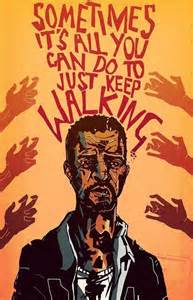
This to me seems a beautiful dead-end, a detour worth taking but not one any alternative game studio or publisher is going to be able to recreate. One might hope it would herald a change in the critical mindset of the average gamer, where he or she were prepared to look beyond gameplay and what we traditionally expect from games and give a higher regard to narrative, theme and message but I doubt it. Telltale’s game was helped massively by licensing a very popular comic book series and anyone else wanting to create experiences as gameplay free and narrative heavy as the TWD better have something similar to fall back on if they want to snare Jack and Jill Xbox. As I said it’s almost a proof of concept, something developers and writers can point to next time someone wants to destroy their story for the sake of an extra level or gameplay mechanic, a small example that proves gamers really do value character and narrative. Hopefully another lesson from the success of TWD will be that gamers are prepared for mature storylines, by which I mean complex and morally grey rather than gory and blood splattered, (which we all know they enjoy) and that more games will concentrate on providing these experiences. The fact that it was such a commercial hit will at least provoke some thought in big boardrooms around the gaming world. My fear is that it is destined to remain a one-off, an unrepeatable hit borne from a loved genre5 and a popular comic on the wings of overwhelming critical praise in a medium where the tastes of the public and professional writers align more than any other.
I think in five, ten years time we might see the game as an interesting, exceptional outlier in the progression of videogames, especially if the forthcoming sequels cannot pull off the same trick. However Tom Bissell, again, offers an alternative view of TWD’s legacy. He talks of a future, powered by new consoles and other increasingly powerful tech where we are playing games whose gameplay is made up of our reactions to those around us. Imagine a way more complex version of the conversation sections of Mass Effect where the reactions of the characters around you are determined not just by what you say but by your eye movements and hand gestures, whole games whose story progression is not based on fighting through conflicts but by how you react to other characters and what choices you make. A whole gameplay experience which is about exploration and interaction. TWD, with its emphasis on human relations could be the precursor for this new kind of experience where the player gets fulfilment from how they relate to the population of this virtual world, finding new experiences and stories opening up as they progress. It is a fascinating idea and would require a shift in our attitude as gamers from violent protagonists to empathic facilitators. Technically TWD is generations away from a game of this nature but its spirit is very similar. It is a game about human interaction and in the same way we can see the roots of Skyrim in game like Zork, maybe we will think back to TWD as our future selves explore yet to be imagined worlds.

[1] According to Wikipedia 1 million individual players have purchased 8.5million episodes although I am not sure how these figures stack up for a 5 episode series – did some people like it so much they bought it twice? And the game has won over 80 game of the year awards – that had to have been beyond Telltale’s wildest dreams when they started development.
2 I think this theory would have some merit but I think the inability of the player to change anything is a choice much more likely to have been imposed by technical limitations than stylistic ones. I think it was just too difficult for Telltale to have implemented a system of player choice that allowed for widely varying endings or divergent storylines. TWD is not even the diamond style interactive storytelling of Mass Effect, where player choice can spread the game in a range of directions before it draws back in for a universal conclusion.
3 I still believe that the lack of real options to change the progression of the storyline was provoked more by design and resource constraints than by narrative choice, but I would be interested to know if this limitation prompted the eventual style of murky, desperate decisions the players were eventually presented with. It is easy to imagine Telltale thinking that they didn’t have the resources to make a truly open ended game where player choice really matters so instead would focus on making the player more concerned with how his companions react to his decisions. In truth this seems more in spirit with what I understand about the comics, (I have only read a small portion of them) in that it focuses on the generally unhappy and fraught relationships between those struggling to survive in the zombie apocalypse. I realise I am in danger of contradicting my earlier disbelief that player choice has been made ineffectual as part of Telltale’s aim to make a wider point about our inability to affect the major forces in our lives. However I think it is more that Telltale realised their limitations but surmised that these restrictions could actually be useful in helping them create a system of choice which more invoked this nasty, morally ambivalent world, drawing the player further into the game and staying true to the spirit of the original works. I guess it can be argued either way quite easily by it has given them the opportunity to present the player with options for which not only is there no right answer but there is also no way for the player to categorise any of the choices they make – no paragon or renegade here.
4 See Jerry Maguire
5 No matter how much people complain zombies are still an immensely popular subject matter, although I think this is because of the world they engender rather than the aimless shambling things themselves. To me they are the same genre as the post-apocalyptic as they give the player the freedom to explore a ruined world free from the restrictions and traditions of government and society and are about survivalist fantasy rather than a certain enemy. Fallout, a hugely successful franchise could just as well be a zombie game, they both appeal to the player or reader in the same way.

10 Comments